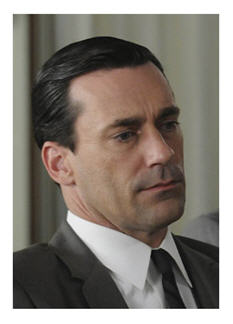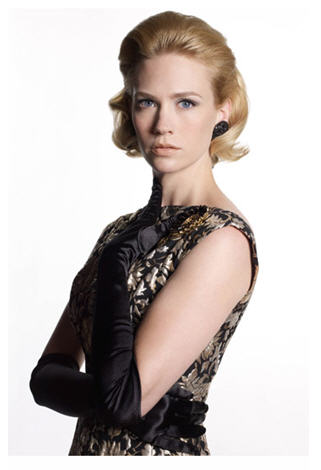“I want less mess around here,” he says. “And that means less stuff. We’re selling this place, and we’re living more simply.”
 Not the words I expect from Don Draper, and I wonder how it is that I’m witness to this private conversation.
Not the words I expect from Don Draper, and I wonder how it is that I’m witness to this private conversation.
Well, somewhat private. It’s a small guestroom in a part of the Draper residence we don’t see on television, and the glam exec appears to be holding court with his current women – all of those who touch his life in some way – Megan and Betty, mother-in-law Marie in the background, and Sally sitting in a corner looking downcast and sullen.
I wonder about Joan’s absence.
The room’s colors are somber, and they remind me of Divorced Don’s apartment where he ached and reflected, writing in his journal as he examined his life perhaps for the first time – processing the end of his marriage, trying to sort things out, clearer in the spare surroundings with little to distract him.
“We all need to sort things out before we can grow strong,” the voice says. It is a woman’s voice. Perhaps Joan is here and I just can’t see her.
Megan is sprawled across a bed looking disconsolate, as Marie stands beside her. Henry Francis is leaning against a wall, indifferent, while Betty – no longer fat – sits primly in a small cornflower blue chair to Henry’s right. Sally seems an afterthought, lingering by the door.
“Why are we here?” she asks.
“You’re part of the mess,” says Don. He looks at Betty and Henry and says: “Both of you.”
Megan frowns and says “I never cared about all this stuff anyway. I only cared about you – and us – and acting.”
Don lowers his voice now, but he sounds tired and he looks disgruntled.
“We’re selling this place,” he says. “I’m not kidding.”
Don exits the small room, and I’m able to follow him with my eyes through the streets of New York as I knew them in the 1980s. I’m aware that the periods are off, but relieved that the difference is 20 years rather than 40.
* * *
He attacks Madison Avenue with lanky strides and without glancing at the passersby. I am following behind him invisibly, noting the absence of Starbucks, the plaid sports coats, less trash on the streets though I wouldn’t term them as clean. Don ducks into a diner rather than a bar and I’m surprised.
The waitress brings him a white porcelain cup and fills it with coffee as she asks what he would he would like. Don points to a Danish under a bell-shaped glass, reaching into his jacket pocket to pull out a small notebook and pen.
The waitress is busty, blond, and tight lipped. She says nothing as she sets the cakey breakfast in front of him and moves on to something else.
Don begins to list the items he no longer wants. He stops for a moment and now I hear his inner voice; he’s running the roster of people he could do without. Not only people, but their phantoms. Betty is here. Pete is here. Adam is here. Lane is not.
I tell myself that Lane must still be alive. Perhaps there is a way to save him.
 Don tears out the page and crumples it up. He reaches in his pocket again and pulls out cigarettes, lighting up. He draws deeply and starts another list. He writes Peggy. He writes Joan.
Don tears out the page and crumples it up. He reaches in his pocket again and pulls out cigarettes, lighting up. He draws deeply and starts another list. He writes Peggy. He writes Joan.
He scribbles a few words then scratches them out and returns to itemizing tables, couches, lamps, and pillows.
* * *
Now I am standing in the center of my living room and taking inventory. My eyes are closed but I don’t need to open them to see my environment, to make mental notes, to construct my own list of chairs, files, paintings, books – some, the remains of another time in life.
Unlike Don, I cannot do this without emotion: I know the stories these objects can tell and their voices are loud and insistent. I am a child, younger than Sally, and we’re antiquing through Amish country. There is a 19th century angel beneath rippled glass inside a maple frame. There is a blue bottle imprinted with the image of Jenny Lind, her hair styled in braids and flowers.
* * *
I wonder why I feel a need to start over once again, why starting over always means losses, goodbyes, destruction before any hope of something new. I wonder why it involves divesting myself of things and people I once loved so deeply.
“Less stuff, less mess,” I say aloud. And a 30-something variation of myself dressed in white overalls hands me a tin bucket of turquoise paint and a wide brush.
“Get to it,” she says. “Whatever it takes. First lighten. Then brighten.”
“I don’t like turquoise,” I say. “That’s the color of my mother’s kitchen with the knotty pine.”
“Tough,” she retorts. She sounds like my mother.
My sons appear from their bedrooms and ask what is going on.
“I’m shedding,” I say. “I need freedom of movement.”
“What about our history?” says the elder.
“What about it?”
He points to a table, and then to a wall with paintings and drawings, meticulously framed and hung salon style.
“If you sell those, you sell our stories.”
“Are these your stories or mine? I may want you to have them if you want them, but are you in a position to house them and feed them?” I ask.
He shakes his head.
Of course he’s not. He’s still dependent on this house, my parenting, my security – such as I can provide it. I’m weary of all of it. I look to the me who stands nearby and she says nothing.
I cannot take her paint and brush. I cannot stride away from my sons’ future of memories. I will not paint in my mother’s colors.
* * *
 I’m tangled in sheets and wake with burning eyes in a small room with little to distinguish it. There is a bed, there is a dinette of gray linoleum and two chairs, there is a small window covered by a grate. I wonder if it overlooks an alley or the city itself.
I’m tangled in sheets and wake with burning eyes in a small room with little to distinguish it. There is a bed, there is a dinette of gray linoleum and two chairs, there is a small window covered by a grate. I wonder if it overlooks an alley or the city itself.
“These are the necessities,” Don says, handing me a notebook and a pen.
I know what he’s suggesting.
“Is there coffee?” I ask.
He shakes his head to say no.
I rub my eyes and struggle for words.
“I’m doing the best I can,” I say. “How do you get from A to B, without being overwhelmed by the rest of the alphabet?”
“You’re not Betty and you’re not Sally,” he replies. “You don’t have to do it immediately, but you can work toward less in order to have more. With less, I sell more, and I make more…”
His voice trails off, and then continues: “The truth is, I want less and I want more. Less of the stuff, and more of everything else.”
I am aware again of the strangeness of this scene – caught between Seasons 4 and 5, caught in this shadowy room, but aware of the small window and the importance of timing.
I get out of bed. I take the pen and paper. I sit at the table.
Now we are writing alongside each other, writing for reflection and healing. Writing to find the proper next steps. Listening to our voices.
Images courtesy AMCTV.com
I’ll take any dream that includes Don Draper, list making or not. Don Draper Dreams? That’s alliteration that draws me in…..